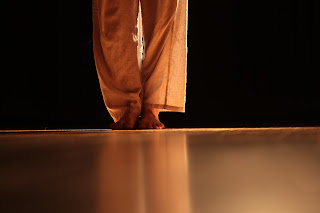why to change sports education in schools
One day in school my teacher discovered
that I am quite good at running. And I loved to run. So it was obvious to send
me to a junior sports club for athletics and train my skills. I only must have been 11 years old, when I
entered the training hall and met the trainer of that club. And still – I will
never forget our first interaction we had: he asked me about my name – and
about my results in running. My results? I had no idea what to answer on that
question. My results in running so far were: running after somebody on the
playground and trying to catch him. My results in jumping were: getting over
the fence or not. My results in climbing a tree were: being on the top of the
tree or falling down. My result in dancing was: enjoying the music or finding
another one. I had no idea, that there might be other results I should care
about.
My trainer asked me to run around the gym
in one circle. When I came back he said: 2:34 minutes. I had no idea how to
process this information. It was irrelevant for me. But from there on I
learned, that sports in our world is supposed to be about numbers: meters you
can jump, distances you can run, minutes you spend swimming, points you receive
for dancing.
And the problem is: if you do not achieve
a certain result, you are judged as “not sporty”, “bad” and “not enough”. It’s
not the same as when you do not succeed in calculating math. Math is just a
concept, it doesn’t belong to you and it’s not a part of your identity.
The problem about judging people’s physicality
is: when being judged in movement, your body is judged, and when your body is
judged, then you are judged. And nobody wants to receive the stamp “not enough”
for his own identity.
We define ourselves through our body. And the
definition other people find for our body impacts our psychological status.
Have you realized that people being good at sports very seldom get bullied at
school? It makes sense: being sporty symbolizes health, power and courage. We
do not confront those who show confidence and act strong. In terms of sports it
means: being fast, coordinated and physically great.
Another point is: movement is mostly
taught by those, who are selected as high achievers in our system: those who
participated at contests, who passed the entry test for sports university and
who have always been valued and encouraged in sports. What they miss is empathy
for those, who sit on the other side of the river. People who have problems catching
a ball or swimming in three different styles.
Movement in our world is quantitative. Not
qualitative. Qualitative would be: how do you like it? Why do you do it? How do
you behave, when moving?
Imagine we would exchange our definitions
on sports and use other words for it: cooperative, imaginative, passionate.
 The moment I realized that our concepts of
movement can’t be useful happened during a long and cold winter day. Out of
boredom I decided to have a run outside in the forest. I took my running shoes
and left the house. There was no time, no limit, no estimated arrival and no
judgment. It was the first time I realized how my breathing changed through the
stages of running. I observed every tree passing by while my feet where
floating on the ground. I let my thoughts travel and come back and started to
understand what people mean, if they associate running with freedom.
The moment I realized that our concepts of
movement can’t be useful happened during a long and cold winter day. Out of
boredom I decided to have a run outside in the forest. I took my running shoes
and left the house. There was no time, no limit, no estimated arrival and no
judgment. It was the first time I realized how my breathing changed through the
stages of running. I observed every tree passing by while my feet where
floating on the ground. I let my thoughts travel and come back and started to
understand what people mean, if they associate running with freedom.
In this particular moment I learned a
lesson, which I believe is crucial for the understanding of teaching movement: Nobody
is allowed to tell my body how to move. My body knows it already. Once we
implement this aspect in our system of sports education we draw a completely
new picture of what we do.
School is the ideal environment to start
developing a society wide culture of change. We should not play games which
divide children into winners and losers. Instead, we should motivate children
to create their own exercises and teach them to their classmates. We should
build playgrounds out of wood and ask every child to find at least five
different ways of crossing a parkour made of blankets. Children’s results in
sports should not correlate with their achievements in running, but with their behavior
and creativity during sports class: how much do they help children, who are not
that fit? How well do they integrate in the group?
Some might say, children need a goal to
reach or something to conquer about. That might be true. But – who said, that
time and range is at the top of all triumphs? It’s about us, teachers, to set
up values and concepts.
Our world needs more patience, acceptance and
valuation in movement. No pressure and no goals. Our world is already packed
with stress, achievements, hate and disgust. The relation to our body and the way
we communicate physicality between each other could be a microwave towards a
bigger movement which impacts society, politics and ideals we have. So we
should start it, while running around a gym hall.



